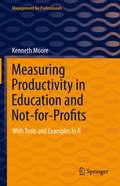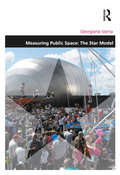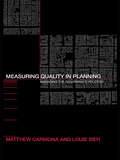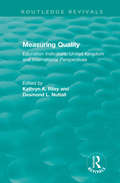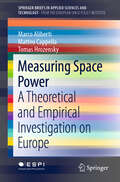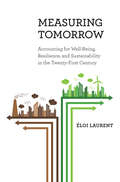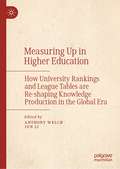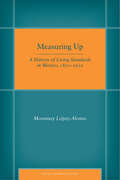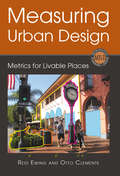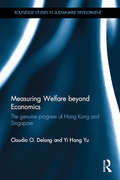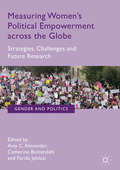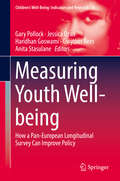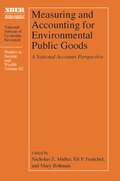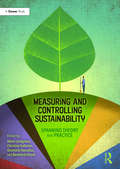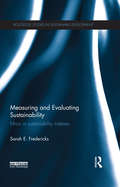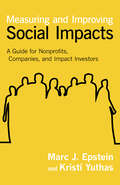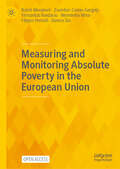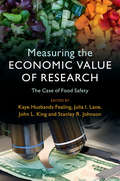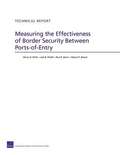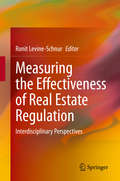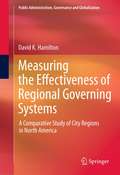- Table View
- List View
Measuring Productivity in Education and Not-for-Profits: With Tools and Examples in R (Management for Professionals)
by Kenneth MooreThis book takes the reader through real-world examples for how to characterize and measure the productivity and performance of NFPs and education institutions—that is, organisations that produce value for society, which cannot be measured accurately in financial KPIs. It focuses on how best to frame non-profit performance and productivity, and provides a suite of tools for measurement and benchmarking. It further challenges the reader to consider alternative and appropriate uses of quantitative measures, which are fit-for-purpose in individual contexts.It is true that the risk of misusing quantitative measures is ever-present. But does that risk outweigh the benefits of forming a more precise and shared understanding of what could generate better outcomes? There will always be concerns about policy and performance management. Goodheart’s Law states that once a measure becomes a target, it is no longer a good measure. This book helps to strike a meaningful balance between what can be measured, what cannot, and how best to use quantitative information in sectors that are often averse to being held up to the light and put on a scale by outsiders.
Measuring Public Space: The Star Model
by Georgiana VarnaIn the rapidly expanding public space debate of the past few years, a recurring theme is the ’loss of publicness’ of contemporary urban public places. This book takes up the challenge to find an objective way to prove or disprove this phenomenon. By taking the reader through a systematic and multi-disciplinary literature review it asks the deceptively simple question: ’What is publicness?’ It answers this by first developing a new theoretical approach - ’The dual nature of public space’, and secondly a new analytical tool for measuring it - ’The Star Model of Publicness’. This pragmatic approach to analysing public space is tested then on three new public places recently created on the post-industrial waterfront of the River Clyde, in the city of Glasgow, UK. By seeing where and why certain public places fail, direct and informed interventions can be made to improve them, and through this contribute to the building of more attractive and sustainable cities. By adopting a multi-disciplinary approach to shed light on this ’slippery’ concept, this book shows how urban design can complement other disciplines when tackling the complex task of understanding and improving the built environment’s public realm. It also bridges the gap between theory and practice as it draws from empirical research to suggest more quantitative approaches towards auditing and improving public places.
Measuring Quality in Planning: Managing the Performance Process
by Matthew Carmona Louie SiehThis book deals with one of the current major debates in planning: how to measure the quality and effectiveness of the output of the planning process. It deals with issues of defining quality, public sector management, the use of indicators and the planning process. Although case study material is drawn from UK practice this topic is universal and the authors include discussions of international practice and experience.
Measuring Quality of Undergraduate Education in Japan
by Reiko YamadaThis book explores how the global trend of quality assurance in higher education is related to the boom of measuring learning outcomes in Japan. It also presents a comparative study in higher education policy between Japan and the US, examining how both countries have reacted to the demands of globalization. This comparative view will help readers understand the present issues Japanese higher education faces and grasp the commonalties and differences between American and Japanese higher education. The book first explores the forces of globalization that have resulted in Japanese universities emphasizing student learning outcomes. Next, it examines how Japanese higher education has learned from the experience of the U. S. , whose higher education reform has been regarded as a model for Japan. The book explains why quality assurance for teaching and learning has become important for all Japanese higher education institutions. Higher Education on a global basis is now facing a great issue. In order to help students in a competitive global market, universities need to become more teaching-and-learning-centered and develop more internationalized curricula. This book provides comparative views for cultural and structural similarities and differences in higher education in two countries which could explain significant differences in the gains students make in college. It will help readers understand not only how student learning outcomes can be measured, but why universities throughout the world must continually strive to become world-class institutions.
Measuring Quality: United Kingdom and International Perspectives (Routledge Revivals)
by Kathryn Riley Desmond NuttallMoves to develop indicators about school effectiveness and performance have been driven by national trends and debates about performance and accountability. Nationally set indicators – such as the standard assessment tasks, or the publication of performance in public examinations – have increasingly become part of the new education currency: a medium for exercising choice and decision-making in the new education market place. As contributors to this book suggest, such a framework is not unproblematic. Originally published in 1994, this book offers a number of insights into the general debate about performance indicators at the time. It explores the background to the debate; the differing perspectives of policy-makers and practitioners; and the purpose, audiences and values of education indicators, both in the UK and elsewhere.
Measuring Space Power: A Theoretical and Empirical Investigation on Europe (SpringerBriefs in Applied Sciences and Technology)
by Marco Aliberti Matteo Cappella Tomas HrozenskyThis book provides an in-depth investigation of the concept of space power and devises a novel conceptual framework for empirically measuring and comparing different typologies of space actors on the basis of clearly defined criteria. In turn, the book identifies a comprehensive set of conditions required to achieve and maintain the status of space power and explores the main political, security, and socio-economic stakes involved. Building on this basis, the book conducts a comparative assessment of the major space actors, the underlying aim of which is to examine Europe’s relative position in the space arena and put into perspective its proclaimed goal to assert itself as a space power, with all of the means and resources this would entail. Given its scope, the book represents a valuable and versatile tool to support European decision-making and offers key insights for executives, space professionals and scholars alike.
Measuring Tomorrow: Accounting for Well-Being, Resilience, and Sustainability in the Twenty-First Century
by Éloi LaurentHow moving beyond GDP will improve well-being and sustainabilityNever before in human history have we produced so much data, and this empirical revolution has shaped economic research and policy profoundly. But are we measuring, and thus managing, the right things—those that will help us solve the real social, economic, political, and environmental challenges of the twenty-first century? In Measuring Tomorrow, Éloi Laurent argues that we need to move away from narrowly useful metrics such as gross domestic product and instead use broader ones that aim at well-being, resilience, and sustainability. By doing so, countries will be able to shift their focus away from infinite and unrealistic growth and toward social justice and quality of life for their citizens.The time has come for these broader metrics to become more than just descriptive, Laurent argues; applied carefully by private and public decision makers, they can foster genuine progress. He begins by taking stock of the booming field of well-being and sustainability indicators, and explains the insights that the best of these can offer. He then shows how these indicators can be used to develop new policies, from the local to the global.An essential resource for scholars, students, and policymakers, Measuring Tomorrow covers all aspects of well-being—including health, education, and the environment—and incorporates a broad range of data and fascinating case studies from around the world: not just the United States and Europe but also China, Africa, the Middle East, and India.
Measuring Up in Higher Education: How University Rankings and League Tables are Re-shaping Knowledge Production in the Global Era
by Anthony Welch Jun LiThis book examines the quality assessment movement in academic scholarship, as globalization prompts a search for global measures of university services and output. It gauges productivity in terms of universal publication metrics, and considers ranking and research productivity from a comparative perspective. The book considers the use of the “impact factor” as a gauge of publication value, noting that this less important in countries lacking central government appropriations to universities and to research. It argues that pressure to publish in certain journals, and to research topics of interest to English language readers, has been felt differentially in English-language systems, compared to others, but also that performance pressures fall more on younger, more juniour, contract staff, than on senior and tenured professors. It problematizes international comparisons of quality, and analyses the benefits of a zone of ideas and metrics in a common language – promoting international mobility, efficiency, collaboration - but also the costs which are rarely borne equally across countries, languages and cultures. The book provides a strong, evidence-based contribution to major debates in contemporary higher education reforms and the measurement of academic output.
Measuring Up: A History of Living Standards in Mexico, 1850-1950
by Moramay Lopez-AlonsoMeasuring Uptraces the high levels of poverty and inequality that Mexico faced in the mid-twentieth century. Using newly developed multidisciplinary techniques, the book provides a perspective on living standards in Mexico prior to the first measurement of income distribution in 1957. By offering an account of material living conditions and their repercussions on biological standards of living between 1850 and 1950, it sheds new light on the life of the marginalized during this period. Measuring Upshows that new methodologies allow us to examine the history of individuals who were not integrated into the formal economy. Using anthropometric history techniques, the book assesses how a large portion of the population was affected by piecemeal policies and flaws in the process of economic modernization and growth. It contributes to our understanding of the origins of poverty and inequality, and conveys a much-needed, long-term perspective on the living conditions of the Mexican working classes.
Measuring Urban Design
by James W. Quinn Reid Ewing Otto Clemente Kathryn M. Neckerman Marnie Purciel-Hill Andrew RundleWhat makes strolling down a particular street enjoyable? The authors of Measuring Urban Design argue it's not an idle question. Inviting streets are the centerpiece of thriving, sustainable communities, but it can be difficult to pinpoint the precise design elements that make an area appealing. This accessible guide removes the mystery, providing clear methods to measure urban design. In recent years, many "walking audit instruments" have been developed to measure qualities like building height, block length, and sidewalk width. But while easily quantifiable, these physical features do not fully capture the experience of walking down a street. In contrast, this book addresses broad perceptions of street environments. It provides operational definitions and measurement protocols of five intangible qualities of urban design, specifically imageability, visual enclosure, human scale, transparency, and complexity. The result is a reliable field survey instrument grounded in constructs from architecture, urban design, and planning. Readers will also find a case study applying the instrument to 588 streets in New York City, which shows that it can be used effectively to measure the built environment's impact on social, psychological, and physical well-being. Finally, readers will find illustrated, step-by-step instructions to use the instrument and a scoring sheet for easy calculation of urban design quality scores. For the first time, researchers, designers, planners, and lay people have an empirically tested tool to measure those elusive qualities that make us want to take a stroll. Urban policymakers and planners as well as students in urban policy, design, and environmental health willfind thetools and methods in Measuring Urban Design especially useful.
Measuring Voting Behaviour in India
by Sanjay Kumar Praveen RaiMeasuring Voting Behaviour in India captures the dynamics of multiple methodologies used for measuring voting behavior in India in the past and present. The authors elaborate on various methods that are used for measuring voters' opinions, attitudes, and perceptions. They discuss the advantages and disadvantages of each method to capture the multiplicity of the electoral experience of diverse voters across different settings in India. This they accomplish utilizing their long experience of conducting national- and state-level election surveys in India and by simultaneous studies using different methodologies. The authors trace the tradition of measuring voting behavior in India from a historical perspective, beginning with a constituency-level study of the Poona Lok Sabha constituency in 1967. They move on to discuss in great detail the survey method for measuring voting behavior widely used in the 1990s and even after that. The book introduces to the readers details of conducting election surveys, that is, sampling, questionnaire design, field work and data collection, data entry and analysis, and challenges in estimating vote share based on surveys. It also delves into the various challenges and hurdles in translating vote estimates into seat estimates, with the nature of the political contest varying from one state to another. The book poses the major challenges in measuring the voting behavior of Indian voters and tries to offer possible solutions to meet these challenges.
Measuring Welfare beyond Economics: The genuine progress of Hong Kong and Singapore (Routledge Studies in Sustainable Development)
by Claudio O. Delang Yi Hang YuDissatisfaction with the Gross Domestic Product (GDP) as an indicator of a country’s development or a population’s wellbeing led to the development of the Genuine Progress Indicator (GPI). The GPI is an aggregate index of over 20 economic, social and environmental indicators, and accounts for both the welfare benefits of economic growth, and the social and environmental costs which accompany that economic growth. The result is better information about the level of welfare or well-being of a country’s population. This book measures the GPI of Hong Kong and Singapore from 1968 to 2010. It finds that for both countries, economic output (as measured by the GDP) has grown more than welfare (as measured by the GPI), but important differences are also found. In Hong Kong, the GPI has grown for the whole period under consideration, while in Singapore the GPI has stalled from 1993. This is in line with most countries and is explained by the "threshold hypothesis" which states that beyond a certain level of economic development the benefits of further economic growth are outweighed by even higher environmental and social costs. The book argues that the growth of Hong Kong’s GPI is due to its favourable relationship with China and in particular its ability to export low-wage jobs and polluting industries, rather than successful domestic policies. A stalling or shrinking GPI calls for alternative policies than the growth economy promoted by neoclassical economists, and the book explores an alternative model, that of the Steady State Economy (SSE).
Measuring Women’s Political Empowerment across the Globe
by Farida Jalalzai Amy C. Alexander Catherine BolzendahlThis volume brings together leading gender and politics scholars to assess how women's political empowerment can best be conceptualized and measured on a global scale. It argues that women's political empowerment is a fundamental process of transformation for benchmarking and understanding all political empowerment gains across the globe. Chapters improve our global understanding of women's political empowerment through cross-national comparisons, a synthesis of methodological approaches across varied levels of politics, and attention to the ways gender intersects with myriad factors in shaping women's political empowerment. This book is an indispensable resource for scholars of politics and gender, as well as being relevant to a global scholarly and policy community.
Measuring Youth Well-being: How A Pan-european Longitudinal Survey Can Improve Policy (Children's Well-being: Indicators and Research Ser. #19)
by Gwyther Rees Gary Pollock Jessica Ozan Haridhan Goswami Anita StasulaneThis volume presents key findings from the EU funded Measuring Youth Well-being (MYWeB) project which assessed the feasibility of a European Longitudinal Study for Children and Young People (ELSCYP). It draws on the original empirical data from a panel of experts in the field of child well-being as well as field experiences from a number of European countries. MYWeB explored strategies and methodological challenges for involving children and young people in well-being research in order to fight poverty and social exclusion. It does so by evaluating different options to measure the well-being of children and young people across Europe using a child centric approach.Written by experts researching children and young people from a variety of disciplinary backgrounds in the areas of sociology, psychology, political science, education, philosophy, economics, social policy, and evaluation.
Measuring and Accounting for Environmental Public Goods: A National Accounts Perspective (National Bureau of Economic Research Studies in Income and Wealth)
by Nicholas Z. Muller, Eli P. Fenichel, and Mary BohmanProvides strategies and approaches for integrating natural capital into environmental statistics. While the importance of natural resources and the contributions of the environment to welfare are apparent, traditional national income and wealth accounting practices do not measure or value environmental public goods. This volume examines the conceptual and empirical basis for integrating natural capital—forests, oceans, and air—into the economic and environmental statistics that inform public policy. It offers innovative approaches to valuing nonmarket environmental goods and services, including strategies for capturing heterogeneity in measurement across types of capital, geography, and individuals. The chapters focus on measuring productivity with adjustments for pollution damage, developing a microdata infrastructure to advance our understanding of the distribution of environmental amenities and hazards, and estimating long-run sustainable development indicators. Case studies consider coastal assets, forests, and marine ecosystems, and develop strategies for implementing specific environmental-economic accounts such as environmental activity accounts and natural capital accounts for forests and the marine economy. As national income accounting standards are updated to incorporate expanded guidance on issues related to natural capital, this timely book will help inform decisions on the measurement and treatment of climate, air, water, and other public goods.
Measuring and Controlling Sustainability: Spanning Theory and Practice
by Bernhard Hirsch Adam Lindgreen Christine Vallaster Dr Shumaila YousofzaiEfforts to establish the measurement and control of sustainability have produced notable tools, but those instruments lack applicability in practice. Increasing the level of standardization of such tools also seems difficult to achieve, because the contexts surrounding the focal organizations differ considerably. Therefore, what we need is a systematic, interdisciplinary assessment of how to measure and control sustainability, so that we can establish an essential definition and up-to-date picture of the field. Measuring and Controlling Sustainability attempts to provide such an assessment in 17 chapters, organized into four main topic sections: (a) organizations and social value creation: concepts, responsibilities, and barriers; (b) accounting, measurement, performance, and diffusion of social value; (c) practical and managerial insights from real-life cases; and (d) choices, incentives, guidance, and ethics. This research anthology provides a comprehensive collection of cutting-edge theories and research that will further the development and advancement of measuring and controlling sustainable efforts in theory and managerial practice.
Measuring and Evaluating Sustainability: Ethics in Sustainability Indexes (Routledge Studies in Sustainable Development)
by Sarah E. FredericksThe indexes used by local, national, and international governments to monitor progress toward sustainability do not adequately align with their ethical priorities and have a limited ability to monitor and promote sustainability. This book gives a theoretical and practical demonstration of how ethics and technical considerations can aid the development of sustainability indexes to overcome this division in the literature and aid sustainability initiatives. Measuring and Evaluating Sustainability develops and illustrates methods of linking technical and normative concerns during the development of sustainability indexes. Specifically, guidelines for index development are combined with a pragmatic theory of ethics that enables ethical collaboration among people of diverse ethical systems. Using the resulting method of index development, the book takes a unique applied turn as it ethically evaluates multiple sustainability indexes developed and used by the European Commission, researchers, and local communities and suggests ways to improve the indexes. The book emphasizes justice as it is the most prevalent ethical principle in the sustainability literature and most neglected in index development. In addition to the ethical principles common to international sustainability initiatives, the book also employs a variety of religious and philosophical traditions to ensure that the ethical evaluations performed in the text align with the ideals of the communities using the indexes and foster cross-cultural ethical dialogue. This volume is an invaluable resource for students, researchers and professionals working on sustainability indicators and sustainability policy-making as well as interdisciplinary areas including environmental ethics; environmental philosophy; environmental or social justice; ecological economics; businesses sustainability programs; international development and environmental policy-making.
Measuring and Improving Social Impacts: A Guide for Nonprofits, Companies, and Impact Investors
by Marc J. Epstein Kristi YuthasPhilanthropic NGOs, foundations, and corporations face endlessly competing needs when deciding to invest or donate for maximum social impact. This book fills an enormous gap by providing a system to measure, operationalize, and improve any organization's impact investments.
Measuring and Monitoring Absolute Poverty in the European Union
by Balint Menyhert Zsombor Cseres-Gergely Virmantas Kvedaras Benedetta Mina Filippo Pericoli Slavica ZecThis book sets out a new framework and methodology for the measuring and monitoring of absolute poverty in the European Union. A comparative needs-based analysis of poverty is presented that allows for cross-country examination. By comparing absolute poverty measurements with existing conventional measures, a new understanding of poverty within the European Union is explored, highlighting that poverty is cyclical and unevenly disturbed across Europe. Issued related to poverty, including food basket development, basket pricing, household compatibility, are also discussed. This book aims to provide a comprehensive account of methodological tools available for the measurement of poverty. It will be relevant to researchers and policymakers interested in absolute poverty measurement.This is an open access book.
Measuring the Economic Value of Research: The Case Of Food Safety
by Kaye Husbands Fealing Julia I. Lane John L. King Stanley R. JohnsonThe scientific advances that underpin economic growth and human health would not be possible without research investments. Yet demonstrating the impact of research programs is a challenge, especially in areas that span disciplines, industrial sectors, and encompass both public and private sector activity. All areas of research are under pressure to demonstrate benefits from federal funding of research. This exciting and innovative study demonstrates new methods and tools to trace the impact of federal research funding on the structure of research, and the subsequent economic activities of funded researchers. The case study is food safety research, which is critical to avoiding outbreaks of disease. The authors make use of an extraordinary new data infrastructure and apply new techniques in text analysis. Focusing on the impact of US federal food safety research, this book develops vital data-intensive methodologies that have a real world application to many other scientific fields.
Measuring the Effectiveness of Border Security Between Ports-of-Entry
by Henry H. Willis Paul K. Davis Wayne P. Brown Joel B. PreddThis report offers research and recommendations on ways to measure the overall efforts of the national border-security enterprise between ports of entry. Focusing on three missions--illegal drug control, counterterrorism, and illegal migration--this report recommends ways to measure performance of U.S. border-security efforts in terms of interdiction, deterrence, and exploiting networked intelligence.
Measuring the Effectiveness of Real Estate Regulation: Interdisciplinary Perspectives
by Ronit Levine-SchnurThis book discusses the fundamental issues regarding the effect of real estate regulation on housing, urban development, and considerations of justice and efficiency. Bringing together the contributions of prominent scholars representing diverse methodologies and academic disciplines, this book offers new perspectives on core topics such as the effectiveness of land use regulation in terms of housing availability, enhanced equality, and sustainable development; and different modes of regulation and their mutual influences. The book’s eleven chapters are divided into five parts which address different aspects of real estate regulation, combining theoretical analysis with a close observation of diverse case studies, from North America and Europe to China, the Middle East, and developing economies. Part I offers cutting-edge analysis on how to measure, model, and understand the impact of zoning and other modes of real estate regulation, from economic and normative theoretical viewpoints. Part II complements Part I by providing historical observations and empirical knowledge on the actual contribution of zoning and historical conservation regulation to cities’ shape. Part III considers the outcomes of business and industrial land development policies. Part IV studies urban land development regulation and allows to compare between two relevant case studies—one from Germany, and the other from Poland. Finally, Part V concerns standardization in the real estate market by analyzing the justification and outcomes of such attempts, particularly in the mortgages market. Providing an interface between theory and practice, the book will appeal to a broad audience, consisting of scholars, policy-makers, practitioners, and students, interested in an interdisciplinary overlook on real estate regulation.
Measuring the Effectiveness of Regional Governing Systems
by David K. HamiltonRegional governance is a topical public policy issue and is receiving increased attention from scholars, government officials and civic leaders. As countries continue to urbanize and centralize economic functions and population in metropolitan regions, the traditional governing system is not equipped to handle policy issues that spill over local government boundaries. Governments have utilized four basic approaches to address the regional governing problem: consolidating governments, adding a regional tier, creating regional special districts, and functional cooperative approaches. The first two are structural approaches that require major (radical) changes to the governing system. The latter two are governance approaches that contemplate marginal changes to the existing governance structure and rely generally on cooperation with other governments and collaboration with the nongovernmental sector. Canada and the United States have experimented with these basic forms of regional governance. This book is a systematic analysis of these basic forms as they have been experienced by North American cities. Utilizing cases from Canada and the United States, the book provides an in-depth analysis of the pros and cons of each approach to regional governance. This research provides an additional perspective on Canadian and U.S. regional governance and adds to the knowledge of Canadian and United States governing systems. This study contributes to the literature on the various approaches to regional governance as well as bringing together the most current literature on regional governance. The author develops a framework of the values that a regional governing system should provide and measures to assess how well each basic approach achieves these values. Based on this assessment, he suggests an approach to regional governance for North American metropolitan areas that best achieves these values.
Measuring the Health of the Liberal International Order
by Andrew Radin Astrid Stuth Cevallos Michael J. Mazarr Miranda Priebe Julia A. Thompson Kathleen Reedy Alexander D. Rothenberg Jordan WillcoxAs part of a larger study on the future of the post–World War II liberal international order, RAND researchers analyze the health of the existing order and offer implications for future U.S. policy. The study’s overall conclusion is that the postwar order continues to enjoy many elements of stability but is increasingly threatened by major geopolitical and domestic socioeconomic trends that call into question the order’s fundamental assumptions.
Measuring the Performance of Public Services
by Michael PiddMeasuring the performance of public agencies and programmes is essential to ensure that citizens enjoy quality services and that governments can be sure that taxpayers receive value for money. As such, good performance measurement is a crucial component of improvement and planning, monitoring and control, comparison and benchmarking and also ensures democratic accountability. This book shows how the principles, uses and practice of performance measurement for public services differ from those in for-profit organisations, being based on the need to add public value rather than profit. It describes methods and approaches for measuring performance through time, for constructing and using scorecards, composite indicators, the use of league tables and rankings and argues that data-envelopment analysis is a useful tool when thinking about performance. This demonstrates the importance of allowing for the multidimensional nature of performance, as well as the need to base measurement on a sound technical footing.
